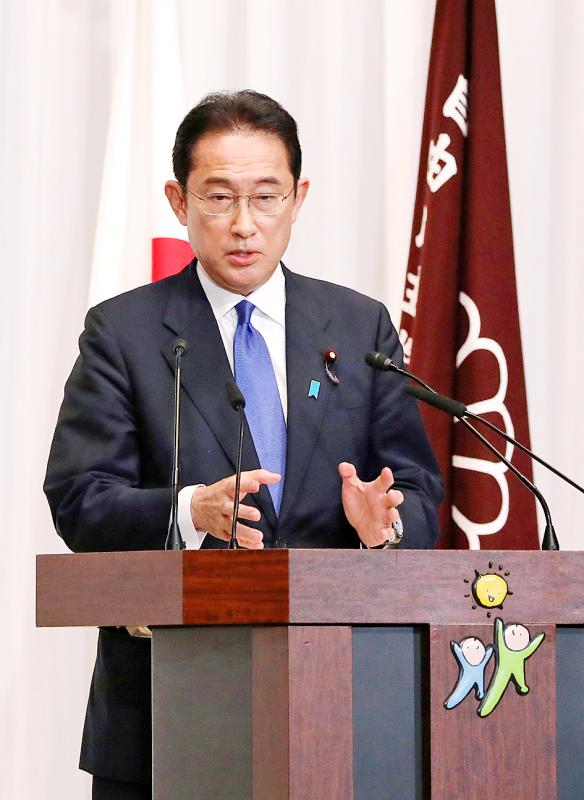Former Japanese minister of foreign affairs Fumio Kishida yesterday won the leadership election of the Liberal Democratic Party (LDP) and is set to become the nation’s next prime minister.
Kishida replaces Japanese Prime Minister Yoshihide Suga as party leader, with Suga stepping down after serving only one year since taking office in September last year.
As leader of the LDP, Kishida is certain to be elected the next prime minister on Monday next week in parliament, where his party and its coalition partner control both houses.

Photo: Reuters
In his victory speech, Kishida vowed to tackle Japan’s “national crises,” including COVID-19, an economy battered by the pandemic, and the declining population and birthrate, while pursuing “important issues related to Japan’s future” through a vision of “a free and open Indo-Pacific” that counters China’s assertiveness in the region.
Kishida beat Japanese Minister for Administrative Reform and Regulatory Reform Taro Kono, who is in charge of overseeing the nation’s COVID-19 vaccination program, in a runoff after finishing only one vote ahead of him in the first round, in which none of the four candidates, including two women, won a majority.
Kishida’s 257-170 win in the second round showed that he garnered more support from party heavyweights, who apparently chose stability over change advocated by Kono.
Kishida said that he has heard from many people complaining that they were being ignored.
“I felt our democracy is in a crisis,” he said.
“I, Fumio Kishida, have a special skill of listening to people. I am determined to make an effort toward making a more open LDP and a bright future for Japan together with you all,” he added.
He has called for a further increase in Japan’s defense capability and budget, and vowed to stand up to China in tensions over Taiwan and Beijing’s crackdown on dissent in Hong Kong.
However, little change is expected in key diplomatic and security policies under the new leader, said Yu Uchiyama, a political science professor at the University of Tokyo.
Kishida also supports close Japan-US security ties, and partnerships with other like-minded democracies in Asia and Europe, in part to counter China and North Korea.
Specifically, Kishida has said that wants to beef up Japan’s coast guard and backs passing of a resolution condemning China’s treatment of members of the Uighur minority.
He wants to appoint a prime ministerial aide to monitor their human rights situation.
“Taiwan is the biggest question for me,” said Jeffrey Hornung, senior political scientist at RAND Corp.
The outgoing Suga administration had been public in having conversations about Taiwan, Hornung said.
“It will be interesting to see whether the new leader takes this approach, such as advocating for Taiwan’s inclusion in” the Comprehensive and Progressive Agreement for Trans-Pacific Partnership, he said.
Taiwan last week applied to join the trade agreement.
Additional reporting by Reuters and staff writer

ENDEAVOR MANTA: The ship is programmed to automatically return to its designated home port and would self-destruct if seized by another party The Endeavor Manta, Taiwan’s first military-specification uncrewed surface vehicle (USV) tailor-made to operate in the Taiwan Strait in a bid to bolster the nation’s asymmetric combat capabilities made its first appearance at Kaohsiung’s Singda Harbor yesterday. Taking inspiration from Ukraine’s navy, which is using USVs to force Russia’s Black Sea fleet to take shelter within its own ports, CSBC Taiwan (台灣國際造船) established a research and development unit on USVs last year, CSBC chairman Huang Cheng-hung (黃正弘) said. With the exception of the satellite guidance system and the outboard motors — which were purchased from foreign companies that were not affiliated with Chinese-funded

PERMIT REVOKED: The influencer at a news conference said the National Immigration Agency was infringing on human rights and persecuting Chinese spouses Chinese influencer “Yaya in Taiwan” (亞亞在台灣) yesterday evening voluntarily left Taiwan, despite saying yesterday morning that she had “no intention” of leaving after her residence permit was revoked over her comments on Taiwan being “unified” with China by military force. The Ministry of the Interior yesterday had said that it could forcibly deport the influencer at midnight, but was considering taking a more flexible approach and beginning procedures this morning. The influencer, whose given name is Liu Zhenya (劉振亞), departed on a 8:45pm flight from Taipei International Airport (Songshan airport) to Fuzhou, China. Liu held a news conference at the airport at 7pm,

AIR SUPPORT: The Ministry of National Defense thanked the US for the delivery, adding that it was an indicator of the White House’s commitment to the Taiwan Relations Act Deputy Minister of National Defense Po Horng-huei (柏鴻輝) and Representative to the US Alexander Yui on Friday attended a delivery ceremony for the first of Taiwan’s long-awaited 66 F-16C/D Block 70 jets at a Lockheed Martin Corp factory in Greenville, South Carolina. “We are so proud to be the global home of the F-16 and to support Taiwan’s air defense capabilities,” US Representative William Timmons wrote on X, alongside a photograph of Taiwanese and US officials at the event. The F-16C/D Block 70 jets Taiwan ordered have the same capabilities as aircraft that had been upgraded to F-16Vs. The batch of Lockheed Martin

GRIDLOCK: The National Fire Agency’s Special Search and Rescue team is on standby to travel to the countries to help out with the rescue effort A powerful earthquake rocked Myanmar and neighboring Thailand yesterday, killing at least three people in Bangkok and burying dozens when a high-rise building under construction collapsed. Footage shared on social media from Myanmar’s second-largest city showed widespread destruction, raising fears that many were trapped under the rubble or killed. The magnitude 7.7 earthquake, with an epicenter near Mandalay in Myanmar, struck at midday and was followed by a strong magnitude 6.4 aftershock. The extent of death, injury and destruction — especially in Myanmar, which is embroiled in a civil war and where information is tightly controlled at the best of times —